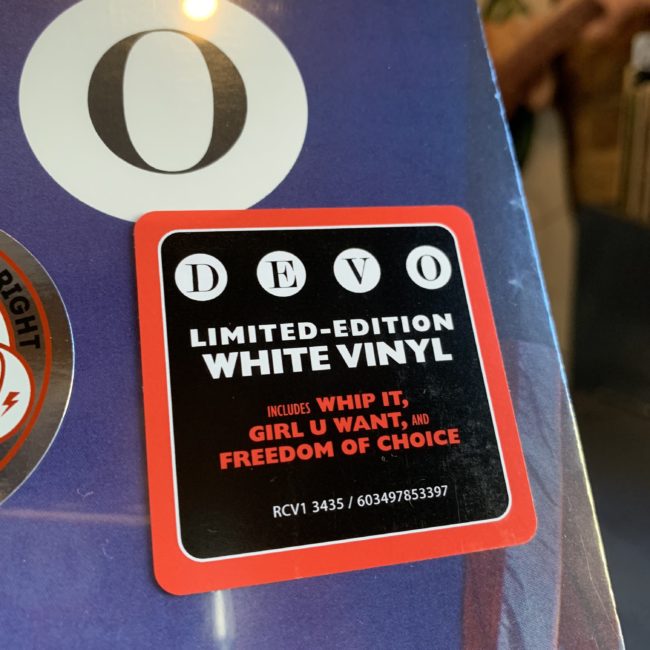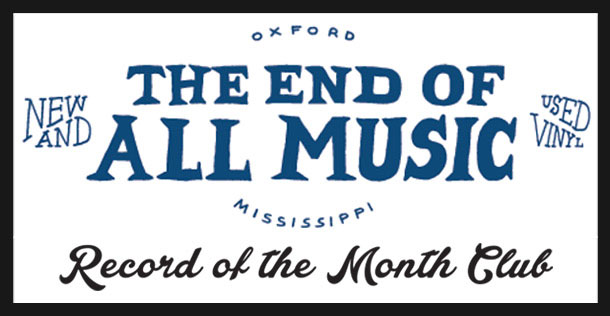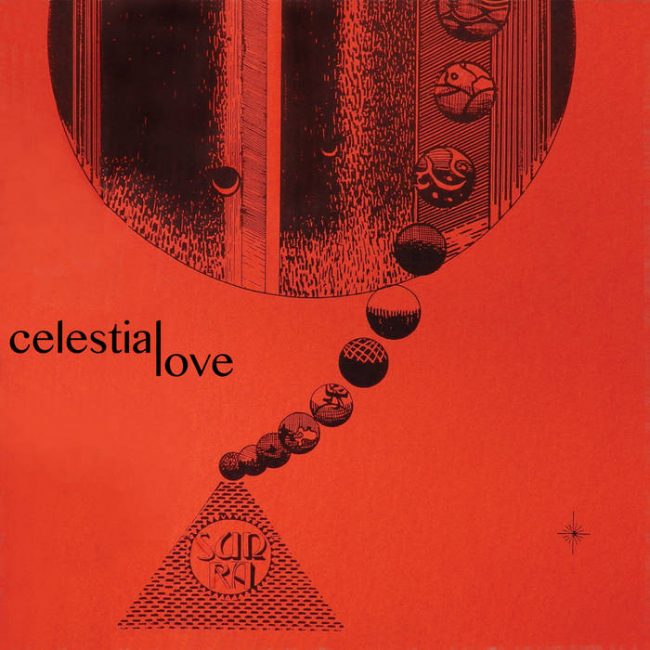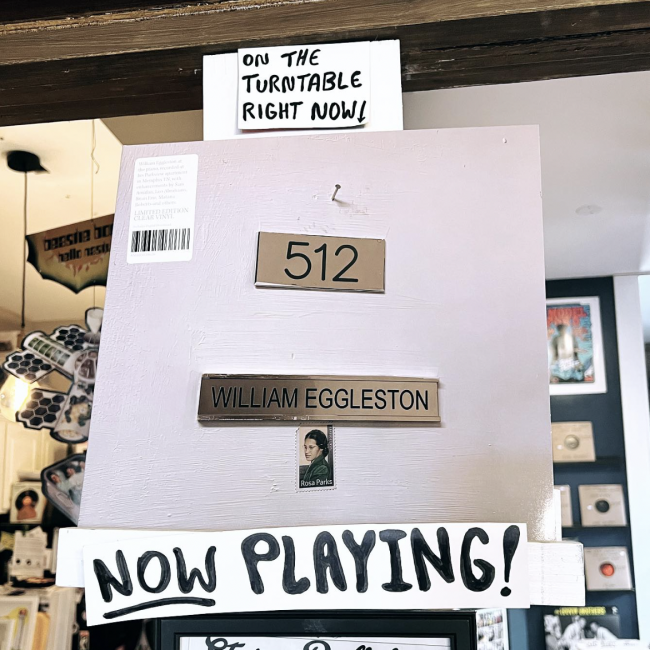We’re kicking of 2020 with some Freedom of Choice! Each January Rhino Records drops a grip of vinyl reissues just for independent record stores. They promote it as “Start Your Ear Off Right.” We’ve picked several records for our Record of the Month Club from this annual campaign. This year we’ve selected DEVO’s crucial album Freedom of Choice, which is pressed on limited, white vinyl.
Club members will get a copy of Freedom of Choice PLUS a 2020 calendar chock full of music history from Rhino Records.
Freedom of Choice is Devo’s third album and was originally released in 1980. The album contains the band’s biggest commercial hit, “Whip It,” which is cool and all but it’s not why we picked this record for our ROTM Club. Devo is one of the most influential art-rock/new wave bands of all time, and Freedom of Choice is nearly full blown synth-pop…in all the good ways. The robot spudboys from Ohio went full on R&B and created this insane record that’s a new kind of punk rock.
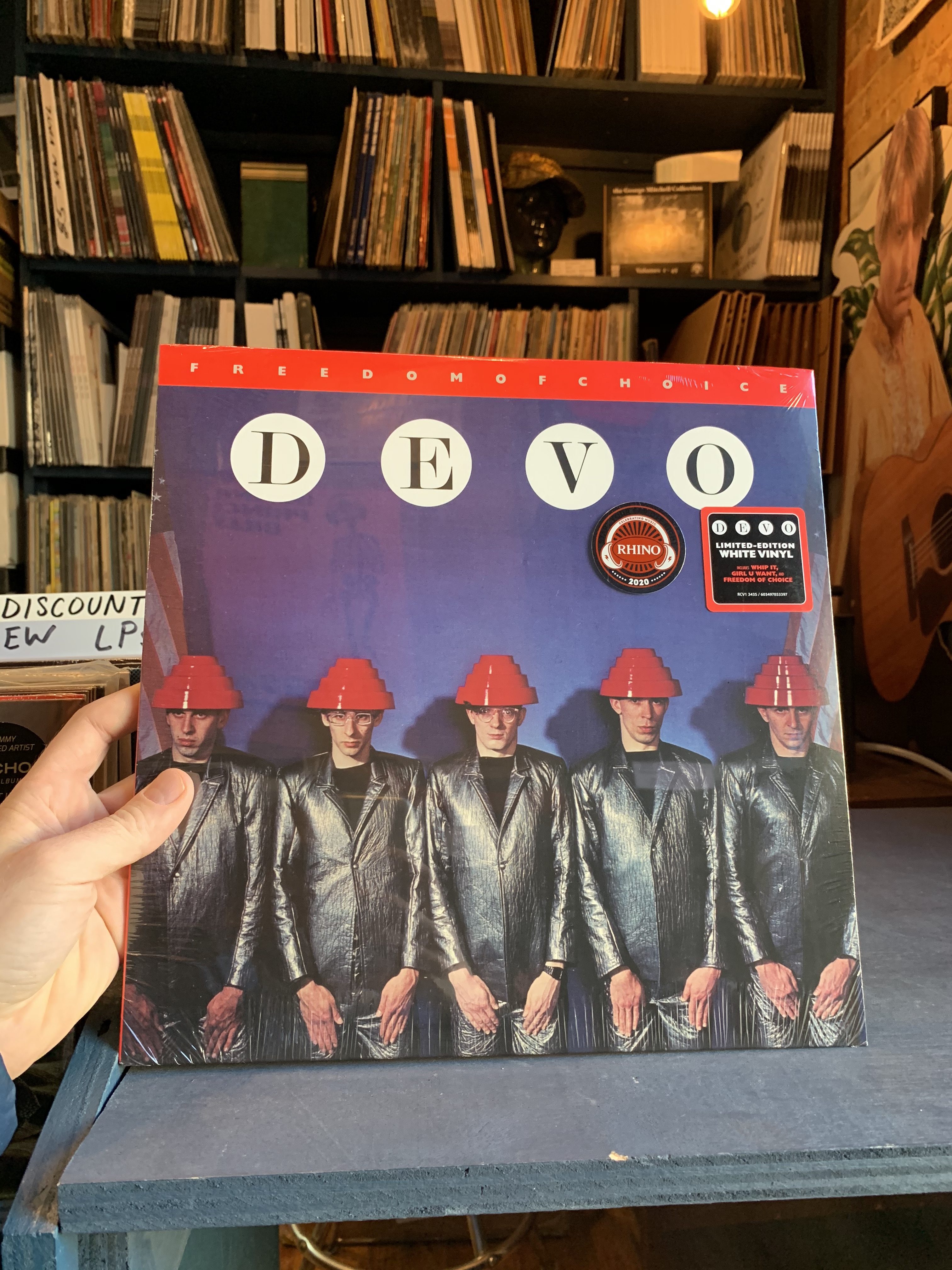
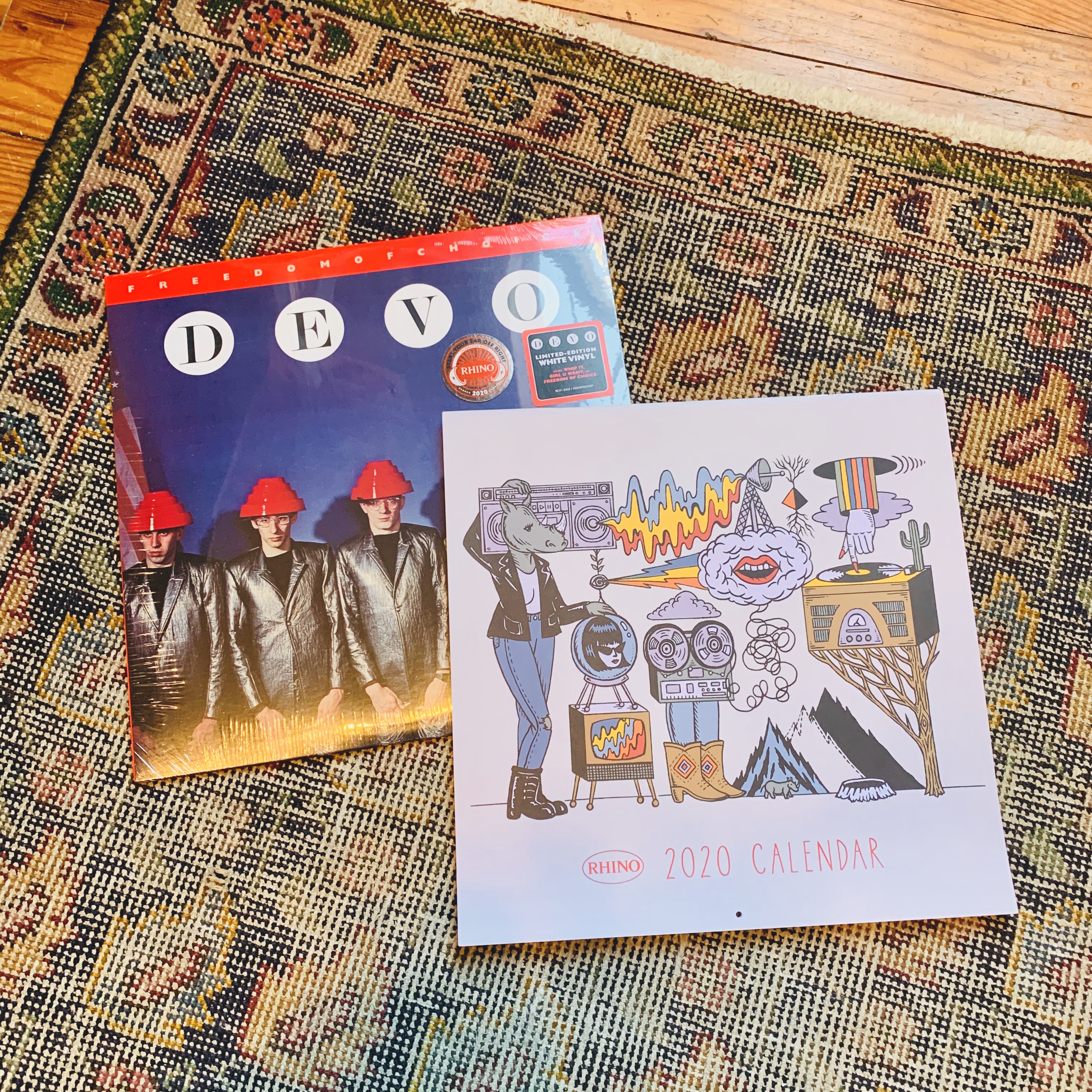
Here’s an excerpt from journalist Evie Nagy’s 33⅓ book about the album:
When tensions eased post-Duty Now and Devo started talking about what to do for their crucial third album, the Midwestern white boys kept coming back to R&B. “Bob Mothersbaugh and I had listened consistently to R&B growing up,” says Jerry. “We loved a lot of Motown and early roots music. And we loved Prince, and Stevie Wonder.” They also liked the sound of the Moog bass, which Wonder was heavily using at the time, and which captured the imagination of Mark, who had told the NME only months earlier that he hoped to use no guitars at all on Devo’s third album (“Anything having to do with technology,” says Jerry. “He never saw a piece of equipment he didn’t like”). They agreed that Jerry would ditch the bass guitar for the Moog, and that they would write songs inflected with Devo robotic R&B as a concept. “That got everyone excited,” says Jerry. “There was a whole idea to it, that this would be an incessant, dance-oriented energy, but with Devo messages in the lyrics.” In other words, using recombo DNA, as Devo would call genetic hybridization, to put a white alien robot’s head on Charlie Wilson’s body.
In 2009, Mark told The Stranger, “it’s ridiculous to think about, but we thought Freedom of Choice was our funk album. That’s as funky as Devo gets, I guess.” But in some ways it wasn’t as much of a stretch as it seems. Devo’s choreographed uniformity already had a connection to the tightly coordinated R&B groups of the ’50s and ’60s; in 1979, Ira Robbins had written that Devo’s live shows had “precision spastic robotics that are as much fun to watch as Little Anthony and the Imperials were back in the days when they wore fluorescent gloves and ties in the dark.” And however Mark feels about Devo’s ultimate ascension to soulfulness, he agrees that once the direction was set, the band was motivated and of one mind in a new way.
For one thing, there was a freshness to the setting—the songs on Freedom of Choice were the first not written in Akron, but instead in Los Angeles, where the band had moved in 1978.
“We were at a place somewhere around Wilcox and Sunset, I think maybe where Amoeba Music is now (at 6400 Sunset Boulevard),” says Mark. “There was a big grocery store or department store that had closed down, and then there was a row of storefronts that still just had their glass windows, like they could have been barber shops or shoe repair places back in the ’60s, but now their windows were painted and they were rehearsal locations. I remember Pink Floyd had the big place.”
Even with the new setting and musical direction, Mark says the band was in the same “one man, one instrument” mindset they’d had for the first two records. “You played one line on your guitar and you made it essential,” says Mark. “We sat in a room and we played the songs over and over again, and honed the parts that we were working on in one room—we could play Freedom of Choice with two guitarists, one keyboard player, one drummer, one bass player. Or sometimes two keyboard players and one guitar player. Bob Casale was a swing man, he would play either instrument depending on what the song needed.”
This, says Mark, was a strength of Devo’s first three albums that changed after Freedom of Choice. “We would keep rehearsing them until we got a guitar part that was definitive from the beginning to the end of the song,” he says. “But that meant if there was a solo, the song had to be strong enough to keep playing through the solo without the guitar playing over it, or just one guitar, or whatever, because we only had five guys.” For the fourth album, New Traditionalists, and beyond, when technology made overdubs easier and near lossless, “we started doing something called additive synthesis. And we didn’t even think of it that way, but it became a process where both Jerry and I were allowed to bypass things that were irritating us in a song, like we didn’t really like the sound of that guitar, we didn’t like the sound of that synthesizer by itself. But when you added another one, another layer, then we started liking it better. It changed the way we wrote. But I think it made our songs less strong.”
Freedom of Choice, says Mark, was “the last album where there was really a lot of a concerted effort where everybody got together every day, and talked about stuff, and wrote things together.”
With the new shared vision for Freedom of Choice, Jerry says, “we were getting results, and the results were really pleasing and exciting . . . and then of course the label really felt we needed a producer, but after that experience with Ken Scott, I was really, really reticent, and felt we could do it better ourselves.”
But then someone suggested talking to Robert Margouleff, the chief engineer at The Record Plant and producer responsible for much of the synthesizer programming on Stevie Wonder albums of the ’70s, including Music of My Mind, Innervisions, and Talking Book. Margouleff and collaborator Malcolm Cecil had been in pioneering electronic duo Tonto’s Exploding Head Band in the early ’70s; the duo had created the enormous polyphonic analog synthesizer TONTO (The Original New Timbral Orchestra) that Wonder later embraced, and which two decades later lived for years in the basement of Mark Mothersbaugh’s Mutato Muzika headquarters in L.A.
It was the end of 1979, and Devo were working with Neil Young on the film Human Highway. “We were nuclear-waste workers who didn’t like our jobs,” says Jerry. “We worked in Linear Valley, and then we did our parody of the Kingston Trio’s ‘It Takes a Worried Man’ in the context of a world that’s full of nuclear pollution. We were in these costumes every day, and our noses were bleeding because we had these hats that the prop department had made for me, with clear tubes coming out of a box from the hat going straight up our noses. Very uncomfortable. And we had theatrical dirt on our faces, and grease, because we were workers. We had these black work jumpsuits on and we had to stay in the costumes because it took too long to get out of them and clean up and put ’em back on for this film production schedule. So, we go meet Bob Margouleff at the Record Plant on our lunch break from Raleigh Studios, about fifteen minutes away. We walk in to meet Bob Margouleff in these outfits. That was a really fine Devo moment.”
“Devo’s Freedom of Choice” by Evie Nagy, published by Bloomsbury in the 33 1/3 series, May 2015.


























